| Construction Rating: | starstarstarstar_borderstar_border |
| Flight Rating: | starstarstarstarstar |
| Overall Rating: | starstarstarstarstar_border |
| Manufacturer: | Polecat Aerospace  |
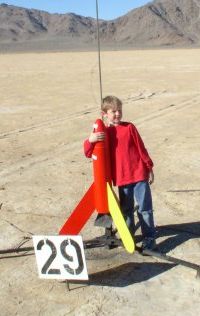 Brief:
Brief:
This is a 5.5" upscale of the classic BT-5 Estes Mosquito, about a 10x
upscale. The Estes is tumble recovery, this one calls for a parachute.
Construction:
This kit includes:
- 5.5” airframe tube
- 54mm MMT
- Precut rings and fins
- Nose cone
- U-bolts, nuts, washers
- 12’ of 9/16 tubular nylon for shock cord
- Two 1/2” ID x 2” long brass tubing for launch lugs
The nose cone had mold seams but a couple passes with 220 grit sandpaper cleaned it right up. The nose cone is just a little lumpy by feel but hard to tell by looking. Airframe tube is pre-glassed. It is very heavy. There is a ragged seam down the tube and the fabric weave prints through. That’s good because it means there isn’t too much glue on the tube. Again a pass with 220 grit cleaned it up and I used high build primer so not much weave shows through anyway.
MMT Rings are really nicely cut & fit perfectly. The MMT rings were without knotholes, checks and voids.
The fins are very cleanly cut and match perfectly. The edges are cut square. Although the fins are "Baltic Birch ply", several voids are visible on the edges of two fins; one knothole on one fin.
Instructions were complete, very nicely illustrated, quick to build. The parts fit snugly and easily, no touch-ups with sand paper required to make them fit.
To help set the fins straight, I drew lines 120 (degrees) apart on a large piece of cardboard, and set the airframe on top of it.
With quick setting epoxy you could fly it naked (no paint) in a little more than an hour or so.
No motor retention provided so we added a Kaplow Klip. The aft MMT ring was plenty thick enough for a 1/8” long (#8-32) T-nut. We have not used the Kaplow Klip because it was difficult to properly bend a single brass strip to fit the adapter and 38mm motor, and have the strip strong enough to hold the motor. Maybe I should have added two T-nuts.
The 54mm->38mm MMT adapter held in perfectly well by masking tape. In fact the 38mm motors hold in perfectly well with masking tape. I prefer mechanical motor retention though, because sometimes the tape holds too well, and it's one more thing to clean up before you can reload and fly again.
Although I helped by mixing the epoxy and my fingers make better fillets, my 6-year-old did most of the work assembling the rocket. It is that easy. Bigger rockets really are easier than smaller ones, the pieces are easier to manage!
The launch lugs are 2” lengths of 1/2” inside-diameter brass tubing, to be glued against a fin and the airframe. The tubing is cut with a tubing cutter, the ends are slightly crimped, and so a 1/2" launch rod doesn’t slide easily. We found that a 7/16” launch rod fit fine and was rigid enough.
Even though I roughed up the tubing the epoxy won’t stick well to the brass, so the launch lugs were popping off by the third flight. Always carry a little bottle of CA to the flightline!! That saved the launch but I think we will replace the tubing with cardboard 1/2” LOC lug tubing. Overall though rail buttons are a better way to go.
Finishing:
Finishing was easy with a big can of white primer and a can of Bright Red and
another can of Bright Yellow from the hardware store.
Some fabric weave is still visible but the nose cone finished quite nicely. I could have spent more time sanding the fin to try to cover the knothole. Not sure about how to properly fill in the voids on the edges of the fins. So what, paint it, let's go flying!
Construction Rating: 3 out of 5
Flight:
Although this includes a 54mm MMT, according to Andy Werner the rocket would be
hard pressed to survive a flight with more than a baby J – the fins start
fluttering. The fins are long and subsequently slightly flexible, even though
built out of 1/4” plywood. Does it matter? Should we glass the fins?
Should I bevel the edges or at least round them with the router?
No, this rocket is not a blaster, it is a low-n-slow crowd pleaser. For the first flight I borrowed a 54mm->38mm MMT adapter; now we have our own that goes with the rocket.
The first flight was on I161W. The rocket seemed to boost clean for a second but the forward closure burned through, so with flames coming out both ends the whole thing came crashing down. Mr Polecat (formerly Skunkworks), Andy Werner, mailed a length of 5.5” coupler and preglassed tube. We cut off the broken top of the body tube and peeled away the burned layer of wrap inside. A little epoxy and red paint, and we’re ready for action again.
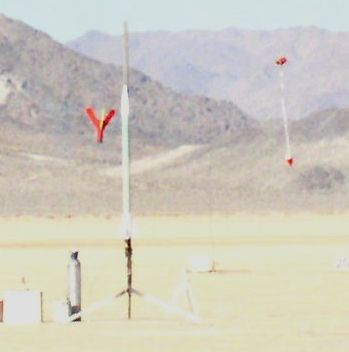
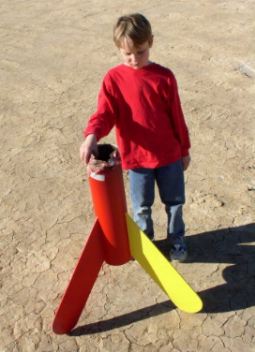
Second and third flights were on I218 Redline motors. With just a slight hitch off the top of the launch rod (where did that launch lug go?), and very little weathercock even with 10+ MPH wind, the Skeeter boosted straight and clean. A nice coast and perfect ejection just past apogee with 6-second delay, the homemade chute filled with a pop and the Skeeter drifted down range … in to the creek. Twice. Gotta love that fiberglass!!
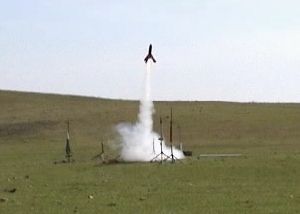
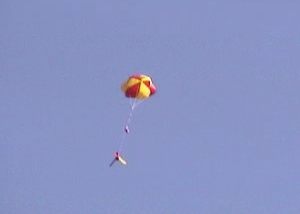
Mr Polecat, Andy Werner, really dislikes rocket simulators. Partially out of my own curiosity and partially because he said not to, I carefully measured everything and made a Rocksim for the kit. The Skeeter’s Rocksim results are ballpark-accurate, to within 10%. Not bad for first pass and good enough to help choose the proper delay, parachute size, etc.
Recovery:
The 12' of tubular nylon is probably adequate. After it was destroyed in the
fire from the first flight, I put in 20' of purple man-rated 9/16" tubular
nylon from REI.
The kit's instructions recommend a 48” to 60” parachute. I split the difference and made a 1.5 meter diameter 6 panel chute. The template for the panels was printed by SpaceCAD. I cut panels out of red and yellow ripstop nylon and sewed them together. It came out really nicely and works well.
Flight Rating: 5 out of 5
Summary:
The kit overall is nicely done and all parts provided are good quality. The
parts fit together easily, the instructions are clear.
To improve the kit, for the price the parts ought to be near perfect. Also a parachute should be included. A few more words about motor selection ought to be included in the instructions. To make it a true level-1 kit, a 54mm->38mm MMT adapter could be included. I added a couple quick-links for the recovery system.
Overall Rating: 4 out of 5
![[NAR]](/images/archive/images/link_nartitle.gif)
![[Sport Rocketry]](/images/archive/images/link_sr_logo.gif)
The following excerpt is from "Sport Rocketry". The intention is to allow guests to get a basic feeling about a kit. We strongly suggest that you get a copy of the referenced Sport Rocketry and read the entire article. Inside you will find many helpful hints in construction as well as other useful information. For more information, use the two links above.
(Sport Rocketry - November/December 2005 - by Duane Wilkey)
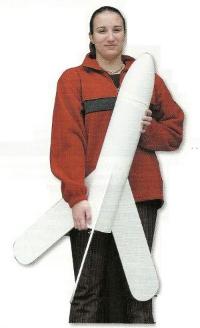 |
| Deirdre, the author's daugher, displays the completed Polecat Aerospace Skeeter. |
"It came in a heavy duty cardboard box with all parts (including the body
tube) wrapped separately in kraft paper to protect them from the hazards of shipping."
"The fins, centering rings, and bulkplate were cut from 1/4" Baltic birch plywood."
"The centering rings were precision cut and fit the motor mount tube and body tube with no additional
sanding."
"The heavy-wall paper body tube was glassed with a single wrap of lightweight fiberglass laminated using
polyester resin."
"The nosecone was customer molded fiberglass..."
"All the hardware needed for a single deployment model was included... with a generous length of tubular nylon
to use as a shock cord."
"The instructions were easy to follow and were well illustrated."
"The kit is a standard, straightforward build."
"The fins are glued to the motor mount tube by their root edges."
"The problem I had with assembling the kit was the fin slots needed to be lengthened by about 1/4" to allow
the fins' root edges to bottom-out on the motor mount tube."
"...the nosecone bulkplate and shock cord anchor are glued into the front of the fiberglass nosecone...the
system works well...no sign of weakening or detaching after several flights."
Overall, the article notes the kit's quality and then describes a series of modifications for his flying fields, including additional fiberglassing and to allow the Skeeter to fly on 38mm and 54mm motors.
 |
 |